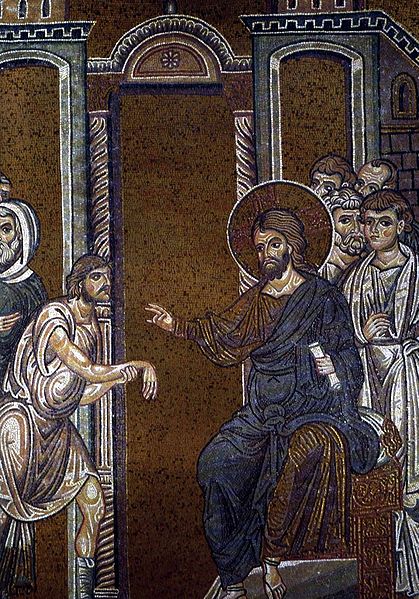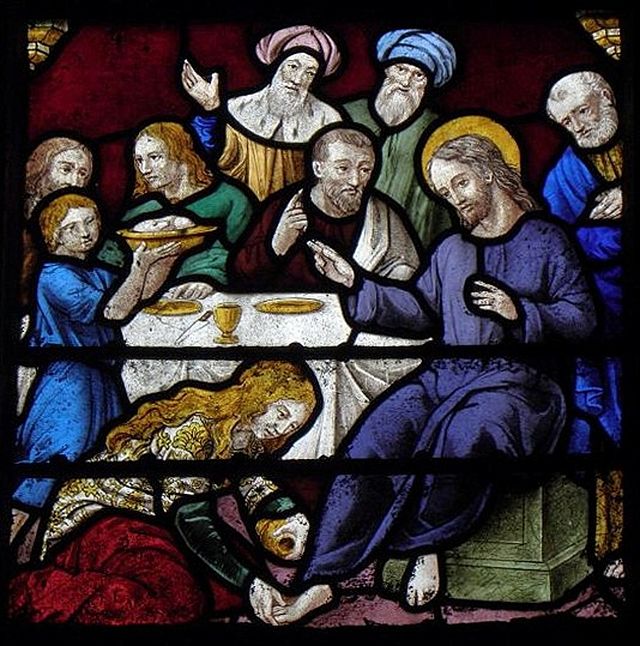
(Wikimedia Commons public domain image)
I really should have connected this entry with the previous one, “New Testament 111,” because it concerns the same fundamental issue.
The Pharisees overlook the miracle of the divine healing in their zeal to find an accusation against Jesus.
It would be rather like criticizing the swimming technique of a lifeguard who had just pulled a drowning man from the ocean, or faulting the grammar of a note of comfort sent to a grieving family, or declining to eat nutritious food when one is hungry because the presentation of the meal is inartistic, or refusing a life preserver because you don’t like its color.
Silliness, and spectacular loss of focus on what really matters.

There’s a clear foreshadowing here of the eventual expansion of Christianity beyond Jewry. People come to Jesus not only from Galilee, Jerusalem, and Judea generally, but from Idumea (Old Testament Edom, roughly today’s Petra in Jordan, which was also the home territory of Herod), and from the formerly Phoenician cities of Tyre and Sidon (still flourishing under those names today, up on what is now the coast of Lebanon). And he heals all those among them who require healing.

This marvelous story seems to be mentioned in all four gospels. It also seems to take place in Bethany, just over the Mount of Olives from Jerusalem.
Once again, the contrast is drawn between deep love and the cold following of rules.
And, of course, there’s a foreshadowing of Judas’s betrayal. John is especially harsh on Judas, suggesting that he was an embezzler long before he was a traitor.

Compare Matthew 9:35; Mark 6:6; 16:9
One of the very striking things about the ministry of Jesus is the prominence of women among his disciples.
Don’t fail to notice this as you read the four gospels. It’s important.

The notion, common among some adherents of the “New Atheism,” that religion is a mental illness or a product of emotional dysfunction, is commonly traced back to the late Dr. Sigmund Freud. (It rests on roughly the same rigorous analysis of empirical data that’s used to support much of Freudianism.)
This passage, however, shows quite clearly that ancient unbelievers already knew how to play the madness card two thousand years ago. It’s nothing new.
Freud regarded God as an illusion growing out of an infantile need for a powerful father figure. Religion, he acknowledged, had perhaps been necessary to help us restrain violent impulses earlier in human history, when civilization was still evolving , but, he argued, it can now be discarded and replaced by reason and science.
Paul Vitz, an emeritus professor of psychology at New York University, turned Freud’s notion on its head in his book Faith of the Fatherless: The Psychology of Atheism by analyzing the relationships of several historically influential atheists — including Dr. Freud himself — with their fathers. He sees atheism as arising, in many of these cases, from problematic relationships with fathers.
Armand Nicholi, clinical professor of psychiatry at Harvard and editor and co-author of The Harvard Guide to Psychiatry, published The Question of God: C. S. Lewis and Sigmund Freud Debate God, Love, Sex, and the Meaning of Life a number of years ago. It’s based on a course that Dr. Nicholi had taught for roughly decades at Harvard College and Harvard Medical School. In my judgment, Freud doesn’t fare well in the comparison.












